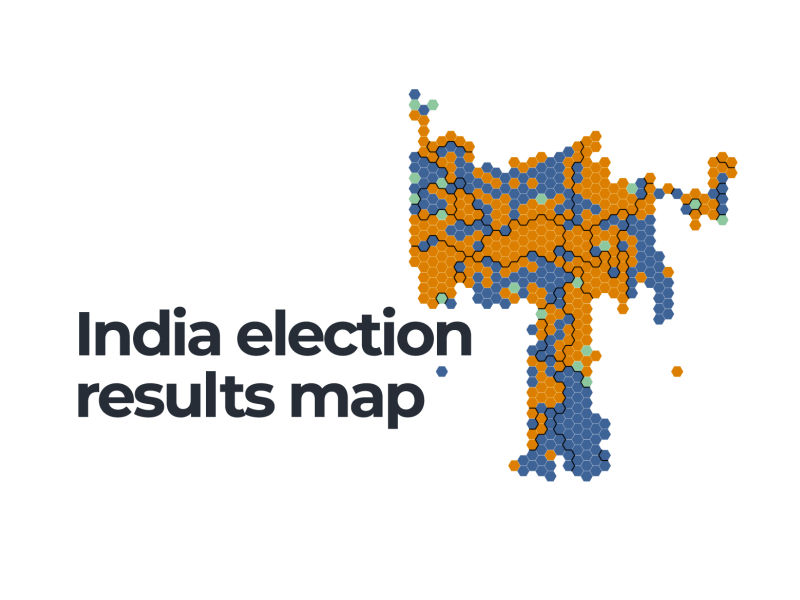Indian elections: A perspective

- 178
- 0
The results of the general elections in India have sealed the failure of Narendra Modi's slogan of 'Ab Ki Baar, 400 Par'.
The defeat in Ayodhya itself is a prominent aspect of the election campaign that the Indian Prime Minister and leader of the Bharatiya Janata Party started with the inauguration of the Ram temple in Ayodhya in January. The BJP is seen celebrating a simple majority victory over the ruling National Democratic Alliance (NDA) after losing a majority as a party for a decade.It is being said that the BJP this time failed to mobilize even the vorters of its parent organization RSS.
The atmosphere of fear created by Modi and those close to him also drove the RSS away from the campaign, this time the Hindutva card did not work and Narendra Modi was able to capitalize on the sarcastic rhetoric about Muslims. Modi, who has been an unstoppable force for the past decade, managed to retain the seat in his constituency Daransi with a slim majority. The BJP has been battered by inflation, unemployment, controversial military reforms and Modi's aggressive and divisive campaign. When Narendra Modi claimed to win 400 out of 543 seats for his alliance (NDA), there were not many rumours, but now it is clear that to become the Prime Minister for the third term, Narendra Modi will depend on the smaller parties in the government coalition. But at this time it is clear that Narendra Modi will be forced to depend on the smaller parties in the government coalition to become the Prime Minister for the third term.
Some observers believe the election results show that Indian voters were tired of Modi extremist policies. At a time when the chances of a coalition government in India are high, on the one hand, the scope for arbitrariness is diminishing for Narendra Modi. On the other hand, the opposition will be strong, which will not only react strongly to the government's actions from time to time, but will also create a movement of no confidence. As soon as the state of the election results came out, the demand of Narendra Modi's resignation from some circles has started gaining momentum. West Bengal Chief Minister Mamata Banerjee has already said that Modi has lost his credibility, he did not get a clear majority, so he should resign immediately. The election results show that the popularity of the Congress party is increasing. It seems that it is heading back to previous location. Election experts say this is good news for secular India. It will be a comfort to the minorities who are humbled by the slogans of Hindutva, the way of making life miserable for the Assamese residents who have been living there for centuries by calling them foreigners and harassing people of different religions including Christians in many provinces.
In view of the mountains of cruelty and brutality that were unleashed on the Kashmiri people with the announcement of the annexation of Occupied Kashmir to India, the current election results for the Kashmiris may have an aspect of reassurance to some extent. Narendra Modi, while forming a coalition government, should review such aspects of internal and external policy that have been causing irritation and agitation. It is not in the interest of both the countries and the whole of South Asia that relations with neighboring Pakistan remain at a very low level after 2019. If Narendra Modi takes steps to normalize relations with Pakistan, increase trade, reduce tension, increase people-to-people contact, it will strengthen regional peace and increase the prosperity of the region. Better results can be achieved in this regard by making the SAARC organization more active and efficient, experts say.It may be mentioned here that during his previous tenuire, Modi’s anti-Muslim and anti-Pakistan agenda was at its peak.It remained busy in negative propaganda against Pakistan and was also busy in cross border firing in Pakistan border area. The world human rights organizations including the Amnesty International had raised its voice which is a good development. In a press briefing in Birmingham, UK, the officials of Amnesty International had urged the then Modi government to immediately stop the process of demolishing the houses of Muslims in India and Kashmir and depriving them of their rights and in this regard, deviation from international laws should be avoided. Now once again, Modi will be in power, though with the support of small groups and he would target Muslims and Kashmiris.One would appeal to the world powers and the sleeping pioneers of human rights to wake up now as Indian Muslims in Indian states of Assam and other states, and the innocent Kashmiris are being victimized for being Muslims and this discrimination against Muslims should be taken notice of at the earliest.
In 2019, the then Modi government's extremism and Hinduism BJP government revoked Article 320 and 35A of the Indian Constitution and ended the special status of Occupied Jammu and Kashmir in violation of international laws. And then started a new wave of Extrajudicial killings, enforced disappearances, detentions, sexual and gender-based violence, restrictions on freedom of expression and religion, including all atrocities within his power and formally started the lockdown. The Modi government also campaigned to convert the Muslim majority population of Kashmir into a minority and in furtherance of this conspiracy, it had issued Kashmiri domiciles to five million Hindus in Occupied Kashmir. Since 2019. thousands of innocent Kashmiris have been deprived of their personal and legal homes and displaced while the process of their dispossessions and displacement is further continuing. The main objective of Modi was to settle Hindus in Kashmir and turn them into majority while depriving the indigenous Kashmiris of their lands. The Indian judiciary was also an equal participant in this conspiracy against Indigenous Kashmiris in the occupied valley. And the objective behind this heinous process, was that Modi wanted to change the demographics of the Muslim-majority Kashmir.In Occupied Kashmir, the ambitions of the Modi government were disgusting and dangerous, where non-Kashmiri Hindus were being brought and settled.To be very specific, there was hardly any cruelty that India had not inflicted on innocent Kashmiris during the previous tenure of Modi. August 5, 2019 was another dark day in the history of Occupied Kashmir. On that day, the Modi government abolished the special status of Kashmir. This was the beginning of another chapter of oppression of Kashmiris.

















































